
Sali Ram Berisha is an Albanian conservative politician who served as the third president of Albania from 1992 to 1997 and 32nd prime minister from 2005 to 2013.
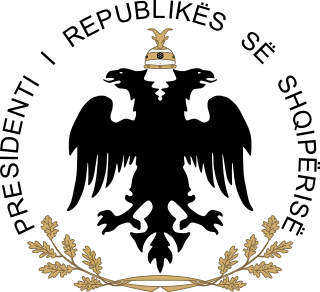
The president of Albania, officially styled the President of the Republic of Albania, is the head of state, commander-in-chief of the military and the representative of the unity of the Albanian people.

Edi Rama is an Albanian politician, painter, writer, former university lecturer, publicist and former basketball player, who has served as the 33rd and current Prime Minister of Albania since 2013 and chairman of the Socialist Party of Albania since 2005. Prior to his tenure as Prime Minister, Rama held a number of positions. He was appointed Minister of Culture, Youth and Sports in 1998, an office he held until 2000. First elected mayor of Tirana in 2000, he was reelected in 2003 and 2007.

Fatos Thanas Nano is an Albanian socialist politician who served as Prime Minister of Albania in 1991, from 1997 to 1998 and from 2002 to 2005. He was the first leader and founder of the Socialist Party of Albania and a member of the Albanian Parliament from 1991 to 1993 and 1997 to 2009. He reformed the anti-revisionist Marxist-Leninist ideology of the Labor Party of Albania into social democracy for its successor, the Socialist Party. During his leadership, the Socialist Party, as a result of reforms, joined the Socialist International and Party of European Socialists. Nano was a candidate in the 2007 presidential election but did not win. He again tried in the 2012 presidential election, but he did not even qualify as a candidate, because the leaders of parties in Parliament obstructed their respective MPs to elect him as candidate in the elections.

The Democratic Party of Albania is a conservative political party in Albania. It has been the largest opposition party in the country since 2013.
Regular elections in Albania are mandated by the Constitution and legislation enacted by Parliament. The Parliament (Kuvendi) has 140 members elected for four-year terms. The electoral system is open list proportional representation. There are 12 multi-member constituencies corresponding to the country's 12 administrative regions. Within any constituency, parties must meet a threshold of 3 percent of votes, and pre-election coalitions must meet a threshold of 5 percent of votes.

Bamir Myrteza Topi is an Albanian diplomat and politician. He also was the President of Albania from July 2007 to July 2012.

Lulzim Basha is an Albanian politician who served as the chairman of the Democratic Party of Albania, and as the leader of the opposition, from 2013 to 2022. Basha was elected as chairman of the Democratic Party of Albania in September 2013 following the Democratic Party's electoral loss which sent them in the opposition. In 2021, he became the first opposition leader in Albanian history to lose two general elections in a row, although Basha claimed the losses came as a result of significant electoral interference by the ruling Socialist Party.

The fall of Communism in Albania, the last such event in Europe outside the Soviet Union, started in December 1990 with student demonstrations in the capital, Tirana, although protests started in January that year in other cities like Shkodra and Kavaja. The Central Committee of the communist Party of Labour of Albania allowed political pluralism on 11 December and the largest opposition party, the Democratic Party, was founded the next day. March 1991 elections left the Party of Labour in power, but a general strike and urban opposition led to the formation of a "stability government" that included non-communists. Albania's former communists were routed in elections in March 1992 amid economic collapse and social unrest, with the Democratic Party winning most seats and its party head, Sali Berisha, becoming president.
In 1991, the Socialist Party of Albania, with specific social democratic ideology took control of the country through democratic elections. One year later the Democratic Party of Albania won the new elections. After 1990, Albania has been seeking a closer relationship with the West. What followed were deliberate programs of economic and democratic reform, but the implementation of capitalism led to the proliferation of pyramid schemes. Chaos in late 1996 to early 1997, as a result of the collapse of these pyramid schemes, alarmed the world and prompted the influx of international peacekeeping forces. In 1995, Albania was accepted into the Council of Europe and requested membership in NATO and is a potential candidate country for accession to the European Union. The workforce of Albania has continued to emigrate to Western countries, especially Greece and Italy.
Parliamentary elections were held in Albania on 24 June 2001. The result was a victory for the ruling Socialist Party of Albania, which won 73 of the 140 seats, resulting in Ilir Meta remaining Prime Minister. Voter turnout was 53.6%.
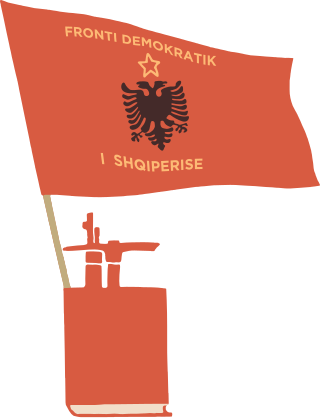
The Democratic Front of Albania was the largest mass organization of the Party of Labour of Albania, which united all other mass organizations of the Party within it. The party was responsible for carrying out the Party's cultural and social programs to the masses, and was in charge of nominating candidates in elections.
Parliamentary elections for a Constituent Assembly were held in Albania on 2 December 1945. Voters were presented with a single list from the Democratic Front, organized and led by the Communist Party of Albania. The Front won all 82 seats.

The Albanian local elections of 2011 took place on 8 May 2011 in Albania. Electors were asked to elect their municipality's mayor, municipal council members, municipal unit mayor, and municipal unit members. The elections were administrated by the Central Election Commission of Albania. Only 9 of the 384 winning candidates were women.
The Fino Government better known as the Government of National Reconciliation was a caretaker government that presided over Albania from 13 March 1997 to 24 July 1997, during the Albanian Civil War. It was created as a result of the social, economic, and political turmoil of early 1997, spurred by the collapse of pyramid schemes and the subsequent loss of many Albanians' life savings. This government was formed in the week following the resignation of the government of Aleksandër Meksi on 1 March 1997 by the major political parties of the country with international support. The Government was voted in the morning session at 10:00 a.m. on 12 March 1997, while received the approval of the President Sali Berisha shortly before midnight on the same day.
Indirect presidential elections were held in Albania on 30 May, 4, 8 and 11 June 2012, the seventh such elections since the collapse of the communist regime in 1991. The first through third rounds of voting were inconclusive. The fourth round resulted in the incumbent party's member Bujar Nishani being elected as President.
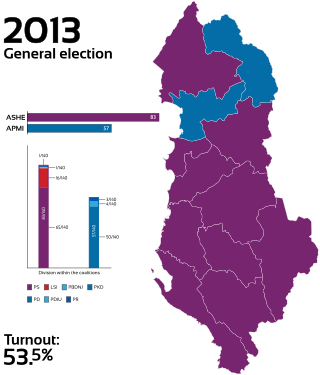
Parliamentary elections were held in Albania on 23 June 2013. The result was a victory for the Alliance for a European Albania led by the Socialist Party and its leader, Edi Rama. Incumbent Prime Minister Sali Berisha of the Democratic Party-led Alliance for Employment, Prosperity and Integration conceded defeat on 26 June, widely viewed as a sign of growing democratic maturity in Albania.

Local elections were held in Albania on 21 June 2015. Voters elected mayors, municipal council members, municipal unit mayors and municipal unit members. The Central Election Commission of Albania was responsible for administrating the elections. This provided that the community type of komuna is abolished and at the same time the total number of communities were reduced from 373 to 61 Bashkia. Those entitled to vote elected the executive and legislative representatives of their communities, the 61 mayors (and on the other hand the total of 1595 municipal councils.
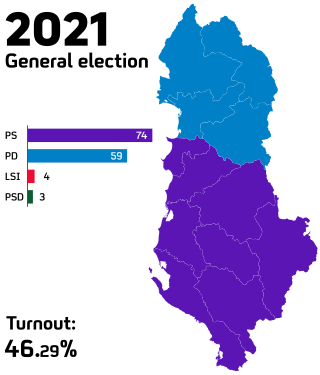
Parliamentary elections were held in Albania on 25 April 2021. It took place during the COVID-19 pandemic.
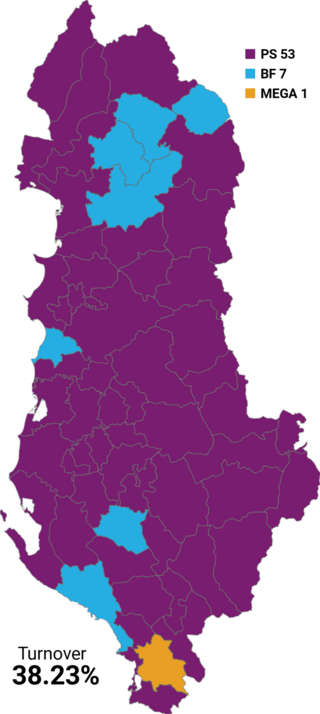
The Albanian local elections of 2023 took place on 14 May 2023 in Albania.
















